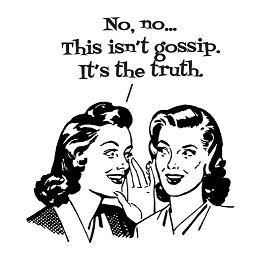The purpose of this blog is to get them talking about talking at the Friday night dinner table.... Please forward / like / tweet....
Happy Birthday shout-out to Avramy Seinfeld - no longer a teenager! :-(
 Last week was about archaeology. This week, for balance, is about neophilism.
Last week was about archaeology. This week, for balance, is about neophilism.
We've all had the birds-and-bees talk.
We've had the honesty talk.
We've had the technology responsibility talk.
We may have even had the "be courteous kind and forgiving" talk.
But have we had the gossip talk?
I had jury duty this week and the pompous judge had every prospective juror (about 100 of us) stand, state our full name, educational level, occupation and spouse's occupation. And at nearly every turn, he would make a witty comment about the responses. Especially if the victim was a young woman.
(I've never seen anything like it and had I been selected I would have informed the judge that I could never convict someone of attempted murder knowing that he knows my full name.)
The gossip talk is when welecture teach our children how utterly evil it is to say anything negative about another person, true or untrue. In their presence or not.
Or to listen to someone else saying it.
Or to hint.
Or to read about it.
This is one of those great ethical teachings of Judaism that we should label with a Jewish label - lashon hara - and praise the kids for avoiding it.
First question for your table: Why do people love to tell, hear and read about gossip?
Second question: Is it ever ethical to say something negative about someone?
Third question: Does it really matter that much?
Shabbat Shalom
PS - Want to get your family on board with ethical speech? Try sharing a few pages of this, this or this book (or the one in the easter-egg link above) every week at the Shabbat table.
PPS - The exceptions: when you're venting, or telling someone something to protect them, or telling a parent or teacher something in order to protect yourself.
Good one this week? Vote with your fingers! Like it, tweet it, or just forward it.
(Haven't tried the new "forward" button yet? Give it a tap!)
 Last week was about archaeology. This week, for balance, is about neophilism.
Last week was about archaeology. This week, for balance, is about neophilism. We've all had the birds-and-bees talk.
We've had the honesty talk.
We've had the technology responsibility talk.
We may have even had the "be courteous kind and forgiving" talk.
But have we had the gossip talk?
I had jury duty this week and the pompous judge had every prospective juror (about 100 of us) stand, state our full name, educational level, occupation and spouse's occupation. And at nearly every turn, he would make a witty comment about the responses. Especially if the victim was a young woman.
(I've never seen anything like it and had I been selected I would have informed the judge that I could never convict someone of attempted murder knowing that he knows my full name.)
The gossip talk is when we
Or to listen to someone else saying it.
Or to hint.
Or to read about it.
This is one of those great ethical teachings of Judaism that we should label with a Jewish label - lashon hara - and praise the kids for avoiding it.
First question for your table: Why do people love to tell, hear and read about gossip?
Second question: Is it ever ethical to say something negative about someone?
Third question: Does it really matter that much?
Shabbat Shalom
PS - Want to get your family on board with ethical speech? Try sharing a few pages of this, this or this book (or the one in the easter-egg link above) every week at the Shabbat table.
PPS - The exceptions: when you're venting, or telling someone something to protect them, or telling a parent or teacher something in order to protect yourself.
Good one this week? Vote with your fingers! Like it, tweet it, or just forward it.
(Haven't tried the new "forward" button yet? Give it a tap!)



